Tumor cells switch to mitochondrial oxidative phosphorylation under radiation via mTOR-mediated hexokinase II inhibition--a Warburg-reversing effect
- PMID: 25807077
- PMCID: PMC4373728
- DOI: 10.1371/journal.pone.0121046
Tumor cells switch to mitochondrial oxidative phosphorylation under radiation via mTOR-mediated hexokinase II inhibition--a Warburg-reversing effect
Abstract
A unique feature of cancer cells is to convert glucose into lactate to produce cellular energy, even under the presence of oxygen. Called aerobic glycolysis [The Warburg Effect] it has been extensively studied and the concept of aerobic glycolysis in tumor cells is generally accepted. However, it is not clear if aerobic glycolysis in tumor cells is fixed, or can be reversed, especially under therapeutic stress conditions. Here, we report that mTOR, a critical regulator in cell proliferation, can be relocated to mitochondria, and as a result, enhances oxidative phosphorylation and reduces glycolysis. Three tumor cell lines (breast cancer MCF-7, colon cancer HCT116 and glioblastoma U87) showed a quick relocation of mTOR to mitochondria after irradiation with a single dose 5 Gy, which was companied with decreased lactate production, increased mitochondrial ATP generation and oxygen consumption. Inhibition of mTOR by rapamycin blocked radiation-induced mTOR mitochondrial relocation and the shift of glycolysis to mitochondrial respiration, and reduced the clonogenic survival. In irradiated cells, mTOR formed a complex with Hexokinase II [HK II], a key mitochondrial protein in regulation of glycolysis, causing reduced HK II enzymatic activity. These results support a novel mechanism by which tumor cells can quickly adapt to genotoxic conditions via mTOR-mediated reprogramming of bioenergetics from predominantly aerobic glycolysis to mitochondrial oxidative phosphorylation. Such a "waking-up" pathway for mitochondrial bioenergetics demonstrates a flexible feature in the energy metabolism of cancer cells, and may be required for additional cellular energy consumption for damage repair and survival. Thus, the reversible cellular energy metabolisms should be considered in blocking tumor metabolism and may be targeted to sensitize them in anti-cancer therapy.
Conflict of interest statement
Figures
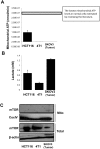
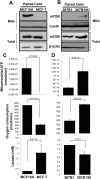
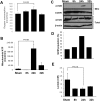
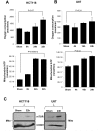
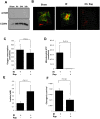
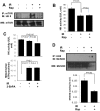

Similar articles
-
Inhibition of Aerobic Glycolysis Represses Akt/mTOR/HIF-1α Axis and Restores Tamoxifen Sensitivity in Antiestrogen-Resistant Breast Cancer Cells.PLoS One. 2015 Jul 9;10(7):e0132285. doi: 10.1371/journal.pone.0132285. eCollection 2015. PLoS One. 2015. PMID: 26158266 Free PMC article.
-
Hexokinase II integrates energy metabolism and cellular protection: Akting on mitochondria and TORCing to autophagy.Cell Death Differ. 2015 Feb;22(2):248-57. doi: 10.1038/cdd.2014.173. Epub 2014 Oct 17. Cell Death Differ. 2015. PMID: 25323588 Free PMC article. Review.
-
Hexokinase-2 bound to mitochondria: cancer's stygian link to the "Warburg Effect" and a pivotal target for effective therapy.Semin Cancer Biol. 2009 Feb;19(1):17-24. doi: 10.1016/j.semcancer.2008.11.006. Epub 2008 Dec 3. Semin Cancer Biol. 2009. PMID: 19101634 Free PMC article. Review.
-
Glucose restriction reverses the Warburg effect and modulates PKM2 and mTOR expression in breast cancer cell lines.Cell Mol Biol (Noisy-le-grand). 2019 Sep 30;65(7):26-33. Cell Mol Biol (Noisy-le-grand). 2019. PMID: 31880514
-
Synthesis of novel methyl jasmonate derivatives and evaluation of their biological activity in various cancer cell lines.Bioorg Chem. 2019 Oct;91:103146. doi: 10.1016/j.bioorg.2019.103146. Epub 2019 Jul 26. Bioorg Chem. 2019. PMID: 31377389
Cited by
-
Inhibition of mTOR Signaling Enhances Maturation of Cardiomyocytes Derived From Human-Induced Pluripotent Stem Cells via p53-Induced Quiescence.Circulation. 2020 Jan 28;141(4):285-300. doi: 10.1161/CIRCULATIONAHA.119.044205. Epub 2019 Nov 11. Circulation. 2020. PMID: 31707831 Free PMC article.
-
The mTOR Pathway Regulates PKM2 to Affect Glycolysis in Esophageal Squamous Cell Carcinoma.Technol Cancer Res Treat. 2018 Jan 1;17:1533033818780063. doi: 10.1177/1533033818780063. Technol Cancer Res Treat. 2018. PMID: 29916308 Free PMC article.
-
Fatty Acid Oxidation-Driven Src Links Mitochondrial Energy Reprogramming and Oncogenic Properties in Triple-Negative Breast Cancer.Cell Rep. 2016 Mar 8;14(9):2154-2165. doi: 10.1016/j.celrep.2016.02.004. Epub 2016 Feb 25. Cell Rep. 2016. PMID: 26923594 Free PMC article.
-
The role of glycolysis in tumorigenesis: From biological aspects to therapeutic opportunities.Neoplasia. 2024 Dec;58:101076. doi: 10.1016/j.neo.2024.101076. Epub 2024 Oct 30. Neoplasia. 2024. PMID: 39476482 Free PMC article. Review.
-
Metabolism of cancer cells commonly responds to irradiation by a transient early mitochondrial shutdown.iScience. 2021 Oct 28;24(11):103366. doi: 10.1016/j.isci.2021.103366. eCollection 2021 Nov 19. iScience. 2021. PMID: 34825138 Free PMC article.
References
-
- Warburg O. On the origin of cancer cells. Scence. 1956;123(3191):309–70. - PubMed
Publication types
MeSH terms
Substances
Grants and funding
LinkOut - more resources
Full Text Sources
Other Literature Sources
Miscellaneous

